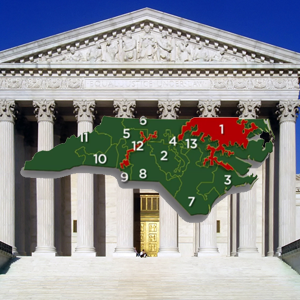 The Supreme Court of the United States last Friday denied the Governor of North Carolina’s request to stay an order requiring legislators to redraw congressional district lines in McCrory, Gov. of NC, et al. v. Harris, David, et al. The order that the governor sought to stay also delays the state’s congressional primary election from March 15, 2016, to June 7, 2016. One expert believes that a vote by recently deceased Justice Antonin Scalia could have affected the Supreme Court’s decision.
The Supreme Court of the United States last Friday denied the Governor of North Carolina’s request to stay an order requiring legislators to redraw congressional district lines in McCrory, Gov. of NC, et al. v. Harris, David, et al. The order that the governor sought to stay also delays the state’s congressional primary election from March 15, 2016, to June 7, 2016. One expert believes that a vote by recently deceased Justice Antonin Scalia could have affected the Supreme Court’s decision.
Earlier this month, a panel of judges for the Middle District of North Carolina ruled that the redrawing of two congressional districts in 2011 was unconstitutional, since the panel determined that race was the main factor in that redistricting. The panel directed that the present maps for North Carolina’s 1st and 12th districts be redrawn within two weeks, which was by the end of the day on Friday, February 19, 2016. That order significantly affected the timing of North Carolina congressional elections, delaying the state’s congressional primary election by a few months, although the state’s presidential and gubernatorial primaries will still proceed in March. Based on the imminence of the primary elections, Governor Patrick McCrory filed a request with the Supreme Court to stay the order. Governor McGrory’s request was filed only a few days before Justice Scalia’s death on February 13, 2016.
State legislators had already redrew the districts by the deadline on February 19, 2016, in the event that the Court did not grant the stay, but the Supreme Court issued a short decision later that night, without comment or dissent, denying the request. A stay would have allowed the present congressional maps, those altered in the 2011 redistricting that the District Court judges found unconstitutional, to remain in effect for this year’s upcoming national elections.
The Supreme Court’s decision to deny Governor McGrory’s request for a stay was one of the Court’s first decisions made after Justice Scalia’s passing. We can’t be certain how a Scalia vote could have influenced the Court’s decision because the vote count was not issued. However, it has been reported that Scalia was expected to vote in favor of the stay. Expert Rick Hasen wrote that, “I had thought the Court would grant the stay, not because there would be a majority of Justices who would necessarily agree on the merits, but because there were likely at least 5 who would see the problem with changing the rules so close to the election (absentee ballots had already been voted in some races).” Such speculation is likely to be a prominent theme in the wake of Justice’s Scalia’s passing. What is certain is that the passing of such a force on the Supreme Court will affect the Court’s decisions for years to come.
